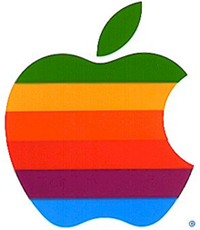Archive for the ‘Technology’ Category
 Apple’s logo can make people think more creatively than IBM’s logo, according to researchers at Duke University’s Fuqua School of Business and Canada’s University of Waterloo.
Apple’s logo can make people think more creatively than IBM’s logo, according to researchers at Duke University’s Fuqua School of Business and Canada’s University of Waterloo.
Professors Gavan Fitzsimons and Tanya Chartrand of Duke, and Grainne Fitzsimons of Waterloo, in an article scheduled for publication in the April issue of the Journal of Consumer Research, claim that a mere 30 millisecond exposure to famous brand logos can influence view behavior.
Their findings are sure to stir up controversy because they suggest that subliminal advertising, until recently regarded as a hoax, may actually have something to it.
In 1957, a market researcher named James Vicary claimed to have boosted sales of Coca Cola and popcorn in a movie theater by flashing the messages “Drink Coca Cola” and “Eat popcorn” so fast that the audience was unaware of the ads. Vicary’s reported findings have been largely dismissed, but recent research suggests he might have been on to something. Read the rest of this entry…
Posted by //
Sean
Date //
Mar 13, 08 - 10:46 am
Categories //
Open Source
Software
Technology
Comments Off on The No-Risk Firefox 3 Beta Tryout
Want to give the Firefox 3 beta a spin, but you don’t want to go through the tedium of backing up your profiles and personal data? Here’s an easy solution if you’re a Windows user.
The folks at PortableApps.com — all open source, all no-install, all the time — have just debuted a new build of Firefox 3 beta 4.
For those not familiar with the Portable Apps paradigm, their mission is to provide you with custom builds of the best open source applications which can run without needing to be formally installed.
They can be mounted on a USB flash drive or copied into a directory and run as-is. They also provide a handy application organizer and launcher which works the same way, and I’ve stumped for them whenever they come up with a noteworthy new edition of one of their apps.
The best thing about the portable edition of FF 3 b4 is that it runs totally separately from any other instances of Firefox in your system, including your user profiles.
Typically, whenever I tested a new build of Firefox, I had to back up my user profile just to be on the safe side. PortableApps’s Firefox uses its own separate user-profile instance, stored along with the application.
There’s a couple of downsides to this. One is that if you want to use your existing bookmarks, you need to export them from your existing instance of Firefox and re-import them.
The other is that things like password fields aren’t inherited, either, but I’ve been using the impossibly handy (and also open source) SuperGenPass to manage passwords, so having passwords saved in form fields isn’t crucial in my case
This isn’t the first beta build of Firefox that has premiered through their system, but it’s one of the first I feel wholly comfortable working with on a daily basis.
So far it’s been extremely stable, markedly faster than even the “accelerated” 2.x builds I’ve used (like Pigfoot), and racks up a good deal less CPU usage when running JavaScript applications, like many of the Ajax-based tools I use for managing web content.
I’m still getting used to the new ways things like bookmarks are handled — for one, the “Smart Bookmarks” system doesn’t particularly interest me; I don’t like it when software tries to second-guess my work habits.
But on the whole I see the finished version of FF 3 in my future — and frankly, the current beta 4 version is already a big part of my present.
Belkin’s latest power-strip adds a very smart feature for travelers: USB ports. The strip has a couple of charge-only sockets along with the three-way mains AC extenders and even comes with a mini-USB cable, obviating the need to carry chargers for most gadgets.

The $25 box also squeezes in a surge-protector for those untrustworthy hotel power outlets. Taken from the product page:
Hotel rooms and airport terminals never seem to have enough power outlets to charge all the devices today’s traveler brings along. Now you can add outlets and peace of mind on business trips and vacations with the Belkin Mini Surge Protector.
This new design features three AC outlets and two powered USB outlets – perfect for MP3 players and mobile phones.
Something to note, the USB outlets cannot be used as a USB hub and does not transmit data. The powered USB outlets on this unit are intended solely for charging devices that can be charged via a USB interface.
Check out the product page for more information. I’ve already ordered two ![]()
Posted by //
Sean
Date //
Mar 3, 08 - 12:01 am
Categories //
Geekery
Google
Technology
Comments Off on Alexander Graham Bell Birtyday 2008
Alexander Graham Bell (March 3, 1847-August 2, 1922) was a Scottish scientist and inventor who immigrated to Canada.
In celebration of his birthday, Google has put up a colorful tribute logo:

I think it’s awesome how Google does these creative themed logos to help remember various people, places and things.
Today, Bell is widely considered one of the foremost developers of the telephone, together with Antonio Meucci, inventor of the first telephone prototype, and Philipp Reis.
Six years after having obtained his telephone patent, he became a naturalized citizen of the United States.
In addition to Bell’s work in telecommunications technology, he was responsible for important advances in aviation and hydrofoil technology.
Posted by //
Sean
Date //
Feb 29, 08 - 7:22 am
Categories //
Apple
Technology
Wireless
Comments Off on 3G Apple iPhone Coming By Mid-Year
Those disappointed by the lack of a 3G announcement at MacWorld can take heart. According to UBS analysts, iPhone chip supplier Infineon Technologies is ramping up production for the next generation iPhone. This time around, it will include a high-speed 3G data radio.
Keep in mind this is just some guidance from analysts. Analysts are people, too, and prone to make mistakes now and again. That said, the note published to investors by UBS yesterday seems more credible than other reports that have been scattered across the Internet.
The unnamed analyst who wrote the report said that “3G-enabled iPhones will be released by mid-year, and that the current EDGE iPhone platform is being ramped down earlier than expected to ‘clean’ inventories.” In addition, German chipmaker Infineon Technologies will be the one to manufacture the necessary chips to give the iPhone its 3G-ness.
As you all remember, the iPhone has been derided from the beginning for its lack of 3G capabilities. Apple’s response was that it wanted to provide the most consistent experience to the widest range of possible customers. That meant using AT&T’s EDGE network, which covers practically every square inch of the U.S. Even though the iPhone includes speedier Wi-Fi, the lack of 3G prevented many from purchasing the device.
The Mac faithful were largely expecting word of a 3G iPhone at last month’s MacWorld. It didn’t happen. No new versions of the iPhone were introduced, save for the 16GB version that was bowed in late January.
What’s interesting is that Apple is hosting an event next week to detail the iPhone SDK. Apple could use this event to make other iPhone-related announcements. Will Steve Jobs actually break the news of a 3G iPhone? Who is to say.
For now, we have to take the UBS analyst’s comments with a grain of salt.
Posted by //
Sean
Date //
Feb 29, 08 - 12:42 am
Categories //
Geekery
Google
Technology
Comments Off on Google Leap Year 2008
When it comes to creative logo design, you can always count on Google to come up with something cool and funky for various holidays and special days of the year.
Check out the Google tribute logo for Leap Year 2008:

So what is leap year some people might be wondering… well thanks to a little research here is a semi official explanation:
A leap year (or intercalary year) is a year containing one or more extra days (or, in case of lunisolar calendars, an extra month) in order to keep the calendar year synchronized with the astronomical or seasonal year.
For example, February would have 29 days in a leap year instead of the usual 28.
Seasons and astronomical events do not repeat at an exact number of full days, so a calendar which had the same number of days in each year would over time drift with respect to the event it was supposed to track.
By occasionally inserting (or intercalating) an additional day or month into the year, the drift can be corrected. A year which is not a leap year is called a common year.
Leap year has always boggled my mind. What happens if you were born on a leap year? You would technically only have a birthday every 4 years… or do you celebrate it the day before or after?
Side note, I’ll be updating Planet Sean on a more regular basis again. I’ve had a few major projects keeping me buried for a little bit but things are calming down now.